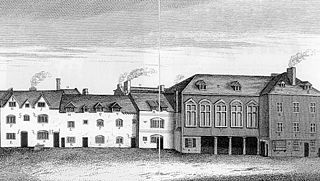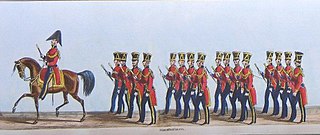Related Research Articles
The Master of the Revels was the holder of a position within the English, and later the British, royal household, heading the "Revels Office" or "Office of the Revels". The Master of the Revels was an executive officer under the Lord Chamberlain. Originally he was responsible for overseeing royal festivities, known as revels, and he later also became responsible for stage censorship, until this function was transferred to the Lord Chamberlain in 1624. However, Henry Herbert, the deputy Master of the Revels and later the Master, continued to perform the function on behalf of the Lord Chamberlain until the English Civil War in 1642, when stage plays were prohibited. The office continued almost until the end of the 18th century, although with rather reduced status.

The Lord Steward or Lord Steward of the Household is one of the three Great Officers of the Household of the British monarch. He is, by tradition, the first great officer of the Court and he takes precedence of all other officers of the household.

The Lord Chamberlain of the Household is the most senior officer of the Royal Household of the United Kingdom, supervising the departments which support and provide advice to the Sovereign of the United Kingdom while also acting as the main channel of communication between the Sovereign and the House of Lords. The office organises all ceremonial activity such as garden parties, state visits, royal weddings, and the State Opening of Parliament. They also oversee the Royal Mews and Royal Travel, as well as the ceremony around the awarding of honours.
The Treasurer of the Household is a member of the Royal Household of the Sovereign of the United Kingdom. The position is usually held by one of the government deputy Chief Whips in the House of Commons. The current holder of the office is Mark Tami MP.
The Comptroller of the Household is an ancient position in the British royal household, nominally the second-ranking member of the Lord Steward's department after the Treasurer of the Household. The Comptroller was an ex officio member of the Board of Green Cloth, until that body was abolished in the reform of local government licensing in 2004. In recent times, a senior government whip has invariably occupied the office. On state occasions the Comptroller carries a white staff of office, as often seen in portraits.

The Master of the Household is the operational head of the "below stairs" elements of the Royal Households of the United Kingdom. The role has charge of the domestic staff, from the Royal Kitchens, the pages and footmen, to the housekeeper and their staff. The appointment has its origin in the household reforms of 1539-40; it is under the supervision of the Lord Steward.

The Marshalsea Court was a court associated with the Royal Household in England. Associated with, but distinct from, the Marshalsea Court was the Palace Court.

The Clerk of the Green Cloth was a position in the British Royal Household. The clerk acted as secretary of the Board of Green Cloth, and was therefore responsible for organising royal journeys and assisting in the administration of the Royal Household. From the Restoration, there were four clerks. Two additional clerks comptrollers were added in 1761, but one of these was redesignated a clerk in 1762.

The Cofferer of the Household was formerly an office in the English and British Royal Household. Next in rank to the Comptroller, the holder paid the wages of some of the servants above and below stairs, was a member of the Board of Green Cloth, and sat with the Lord Steward in the Court of the Verge. The cofferer was usually of political rank and always a member of the Privy Council.
The Master of the Harriers was a position in the British Royal Household, responsible for overseeing the Royal harriers. It was allowed to lapse in 1701, but was revived in 1730 as the "Master of the Harriers and Foxhounds". The position was abolished in a reorganization of the Royal Household in 1782.

The King's Wardrobe, together with the Chamber, made up the personal part of medieval English government known as the King's household. Originally the room where the king's clothes, armour, and treasure were stored, the term was expanded to describe both its contents and the department of clerks who ran it. Early in the reign of Henry III the Wardrobe emerged out of the fragmentation of the Curia Regis to become the chief administrative and accounting department of the Household. The Wardrobe received regular block grants from the Exchequer for much of its history; in addition, however, the wardrobe treasure of gold and jewels enabled the king to make secret and rapid payments to fund his diplomatic and military operations, and for a time, in the 13th-14th centuries, it eclipsed the Exchequer as the chief spending department of central government.
The Treasurer of the Chamber was at various points a position in the British royal household.
The Removing Wardrobe was a sub-department of the British Royal Household. It was responsible for looking after the furnishings which travelled from palace to palace. The office was headed by the Yeoman of the Removing Wardrobe, assisted by two grooms and three pages, all appointed by the Lord Chamberlain. The department was abolished in 1782. The first Yeoman of the Removing Wardrobe was Clement Kinnersley, the man who saved the Coronation Spoon, the oldest of the Crown Jewels of the United Kingdom used in the Coronation.
Gentleman of the Horse was a position in the stables department of the British Royal Court, subordinate only to the Master of the Horse. It existed from 1693 until abolished in 1782, and carried a salary of £256.

The Knight Marshal is a former office in the British Royal Household established by King Henry III in 1236. The position later became a Deputy to the Earl Marshal from the reign of King Henry VIII until the office was abolished in 1846.

Thomas Lee Dummer was an English Member of Parliament for Southampton (1737–1741) and Newport (1765–1768).
The Clerk Marshal was an official of the British Royal Household in the department of the Master of the Horse. From the Restoration the office was held with that of Avenor until the latter post was abolished in 1793. The office of Clerk Marshal was then combined with that of First or Chief Equerry until 1874. From 1841 the holder was a member of the Government, but the office ceased to be a political one from 1866.
Anne Howard, Countess of Effingham, formerly Anne Bristow, was the second wife of Francis Howard, 1st Earl of Effingham.

John Fox (1611–1691) was Clerk of the Acatry to King Charles II, which below stairs department was responsible for meat destined for the royal tables. In 1660 the department comprised a clerk and a sergeant, appointed by royal warrant, a yeoman of the salt stores, yeomen and grooms, appointed by the Lord Steward's warrant.
The verge was an area of 12-mile (19 km) radius around the court of the monarch of England, and later Britain, that was subject to special legal jurisdiction in some aspects. A Court of the Verge heard legal cases arising from within the verge or pertaining to members of the Royal Household. The Coroner of the Household held jurisdiction for the investigation of deaths within the verge. The Clerk of the Market held powers over markets held within the verge. The Board of Green Cloth originally issued arrest warrants within the verge but later developed a role as a licensing authority.
References
- ↑ The political state of the British Empire. 1818. p. 179. Retrieved 30 April 2019.
The Board of Green Cloth is one of the most ancient courts in England, and has jurisdiction in all offences committed in ...
- ↑ The Republican. T. Davison. 1820. p. 476 . Retrieved 30 April 2019.
The officers that sit in the counting-house, and at the board of green cloth, with their respective salaries, are, besides the lord steward in chief, the treasurer and cofferer of the household, the comp: troller, the master of the household, two clerks ...
- ↑ 'The household below stairs: Clerks of the Green Cloth 1660-1782' in Office-Holders in Modern Britain: Volume 11 (Revised), Court Officers, 1660-1837, ed. R. O. Bucholz (London, 2006), British History Online
- ↑ 'The household below stairs: Clerks of the Household 1782-1815' in Office-Holders in Modern Britain: Volume 11 (Revised), Court Officers, 1660-1837, ed. R. O. Bucholz (London, 2006), British History Online
- ↑ 'The household below stairs: Secretariat of the Board of Green Cloth 1813-37' in Office-Holders in Modern Britain: Volume 11 (Revised), Court Officers, 1660-1837, ed. R. O. Bucholz (London, 2006), British History Online
- 1 2 3 Howard, Alexander (1964). Endless Cavalcade: A Diary of British Festivals and Customs. London: Arthur Barker. p. 41.
- ↑ Tout, T. F. (1928). Chapters in the administrative history of mediaeval England: the wardrobe, the chamber, and the small seals (Volume IV). Manchester University Press. pp. 222–224. Retrieved 28 July 2024.
- 1 2 3 4 "Records of the Lord Steward, the Board of Green Cloth and other officers of the Royal Household". The National Archives. Retrieved 28 July 2024.
- ↑ The True State of England. London: C. King. 1734. p. 11.
- ↑ An Explanatory Account of the nature and business of the several offices, posts, employments, and places of trust in this Kingdom. London: The Editor. 1727. pp. 37–38.
- ↑ "Explanatory Notes to section 195, Licensing Act 2003". Legislation.gov.uk . Retrieved 22 October 2020.
- ↑ Rogers, R. (2012). Who Goes Home: A Parliamentary Miscellany. Biteback Publishing. p. 34. ISBN 978-1-84954-480-1 . Retrieved 30 April 2019.
The Board of Green Cloth audited the accounts of the Royal Household and sat as a court on offences committed on ... for premises controlled by the Royal Palaces, and did not finally disappear until 2004, following the Licensing Act 2004.
- ↑ "section 193, Licensing Act 2003". Legislation.gov.uk . Retrieved 22 October 2020.